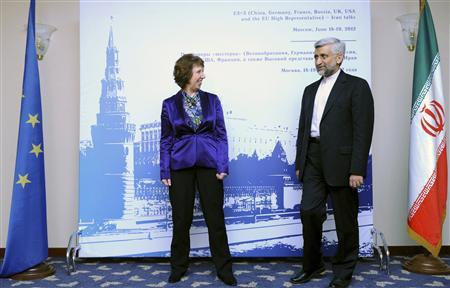Wednesday 24 October 2012 - 11:28
Story Code : 8558
Major powers examine long-shot options in Iran talks
BRUSSELS/VIENNA, Oct 23 (Reuters) - Big powers may ask Iran for stricter limits on its nuclear work if it wants an easing of harsh sanctions - a long-shot approach aimed at yielding a negotiated solution that has eluded them for more than a decade.
A solution to the standoff is increasingly urgent. The longer the impasse goes on, the closer Iran could get to the technological threshold of a capability to build an atom bomb, raising the odds of Israeli strikes against its installations.
Western diplomats say the possibility of revising their negotiating tactic is under discussion as they prepare for possible talks with Iran after the Nov. 6 presidential election in the United States, following three inconclusive rounds this year.
One option could be for each side to put more on the table - both in terms of demands and possible rewards - than in previous meetings in a bid to break the stalemate despite deep scepticism about the chances of a breakthrough any time soon.
Years of diplomacy and sanctions have failed to resolve a dispute between the West and Iran over its nuclear programme, raising fears of Israeli military action against its arch foe and a new Middle East war damaging to a fragile world economy.
"The next meeting would have to be well prepared," said one Western diplomat. "There could be interesting new developments, like more demands and more concessions."
Israel, believed to be the Middle East's only nuclear power and convinced a nuclear Tehran would pose a mortal threat, says Iran could arrive at the point of being able to "weaponise" enriched uranium next spring or summer.
Iran denies accusations it is seeking nuclear weapons and has so far refused to meet demands that it scales back its atomic activity, insisting on immediate sanctions relief.
Western powers have rejected that and, instead, offered limited incentives focused on technology cooperation. They have also ramped up punitive measures to draw Iran, one of the world's biggest oil producers, into meaningful talks.
Another Western diplomat cautioned that a new strategy for diplomacy had yet to be finalised by Iran's six interlocutors: the United States,�China, Russia, Britain, France and Germany.
But he said a new meeting with Iran soon after the U.S. vote could not be ruled out, and preparations were under way.
"It is possible there may indeed be some meeting in November to discuss an offer ... and that we ask more of the Iranians, in which case we could offer more," this diplomat said.
SEARCHING FOR SOLUTIONS
In a possible sign diplomacy could gather speed after the U.S. election, the New York Times has reported Washington and Iran have agreed in principle to hold one-on-one negotiations, although the White House denied that any talks had been set.
In the earlier meetings this year, the powers called on Iran to stop producing higher-grade enriched uranium, shut down its Fordow underground facility and ship out its stockpile.
Iran rejected the proposal, described by Western officials as an initial step to build confidence, and demanded recognition of its "right" to refine uranium, activity which can have both civilian and military purposes, as well as lifting of sanctions.
But for Iran to secure any relaxation of the pressure, it would have to take substantial additional action beyond the so-called "stop, shut and ship" demand, another Western official said. "For a lifting of sanctions they would have to do much more than just these three steps," the official said.
A more-more strategy would make sense as the West would want to see strict limits to Iran's entire enrichment programme, said nuclear expert Mark Fitzpatrick of the International Institute for Strategic Studies (IISS) think-tank.
Any new proposal would also have to take into account Iran's growing holdings of refined uranium as well as its expanding enrichment capacity, according to Fitzpatrick.
In return for making concessions, Iran "will need some sanctions relief beyond the meagre measures that were offered in the earlier rounds of talks," he added.
But Ali Vaez of the International Crisis Group said a "gulf of expectations" between negotiators and the irreversible nature of many sanctions made a "more-for-more" strategy implausible.
"Managing to seal a 'big-for-big' deal in the total absence of trust would be equivalent to reversing the law of gravity."
Iran has enough low-enriched uranium for several atomic bombs if it were refined to a high degree, but may still be a few years away from being able to assemble a missile if it decided to go down that path, analysts say.
Experts say it has become increasingly unrealistic to expect Iran to suspend all its enrichment, even if this demand is enshrined in a series of U.N. Security Council resolutions, and the aim should be to restrain the activity as much as possible.
Daryl Kimball of the Washington-based Arms Control Association said high-level U.S.-Iranian talks could help to reach a deal and reduce the risk of a nuclear-armed Iran.
Negotiators should seek to limit Iran's enrichment, cap its stockpiles and give U.N. inspectors more access to ensure it does not engage in weapons-related nuclear activity. In return, there would be a "phased rollback of sanctions," he said.
The Iran Project is not responsible for the content of quoted articles.
# Tags











